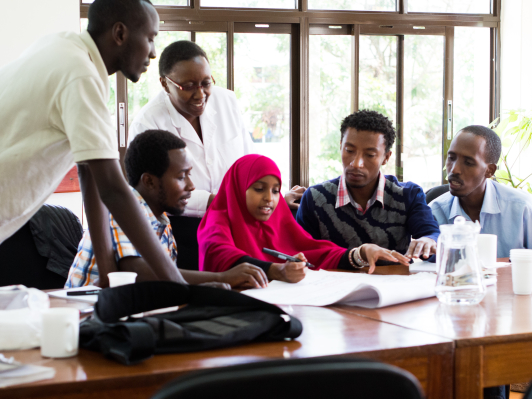Asha’s* tiny frame does not do justice to the huge impact this 23-year-old Somali woman is making as a community health worker (CHW) in her refugee neighborhood in Nairobi. Since the launch of RefugePoint’s community health program in 2011, our small team of CHWs has provided more than 5,500 urban refugees with critical health information and direction on how to better access existing medical services in their areas.
According to RefugePoint Medical Unit Manager Esther Kamau, “two years ago our outreach staff discovered that many of our refugee clients and their neighbors either did not know they could visit local medical clinics or were unable to access services due to cultural and language barriers.”
To address this problem, RefugePoint partnered with the Kenyan Ministry of Health to develop the community health worker program, which involves employing refugees to collect health-related data in their local neighborhoods and to disseminate essential health information in their native languages to their fellow community members.
“I always make sure that refugees know that I’m also a refugee so that they feel comfortable letting me into their homes,” explained Asha, who joined the team in January 2013 and works extensively in Somali neighborhoods.
Each week, Asha and her colleagues conduct approximately 20 home visits. They talk to refugee families about nutrition, sanitation, maternal health care, and other related topics. They also refer families to clinics where they can receive affordable medical care. If a particular health issue seems to be a common concern for many families, Asha and her colleagues will organize community education forums for larger groups. This year, Asha has been especially focused on distributing water purification tablets and directing refugees to nearby sources of clean water during her 30-minute home visits after discovering that few families had reliable sources of potable water.
In 2012, RefugePoint completed a public health indicator survey in one Somali refugee neighborhood, where previously the Kenyan Ministry of Health had had difficulty connecting with local residents due to cultural and language barriers. The survey highlighted the impact of the community health worker program in this location over a ten-month period. Of the 530 refugees sampled, there were significant decreases in preventable illnesses, as well as increases in the number of individuals accessing public health care. For example, diarrheal and other water-born illnesses decreased by 12% while hospital deliveries versus home births increased by 51%. In 2012, the Kenya Ministry of Health also credited the CHWs with helping to increase immunization rates from 64% to 97% within the same district.
In 2014, Asha and her 13 colleagues aim to provide 4,000 refugees with similar medical, psychosocial, and protection information. They also plan to conduct a similar impact survey at the end of the year, which includes a broader sample of nationalities across different refugee neighborhoods. The baseline for this study was completed in February.
“Asha is incredibly influential in [her neighborhood] and many people look up to her,” said RefugePoint Nurse Rebecca Nyokabi, who supervises the community health workers. “I work closely with her because I trust her sharp insight and energy.”
Looking ahead to her own future, Asha now hopes to become a doctor due to her experiences as a community health worker. “I have had the opportunity to meet so many different people and to see change happening in our area,” she said. “I met an old woman with two deaf daughters who were afraid of going to the public clinics even when they were sick. I went with them, helped them understand what was happening and they were so happy they could get medical care.”
*Name changed for security purposes
